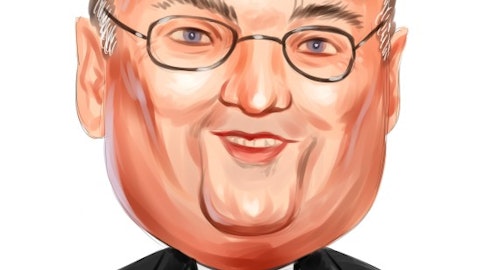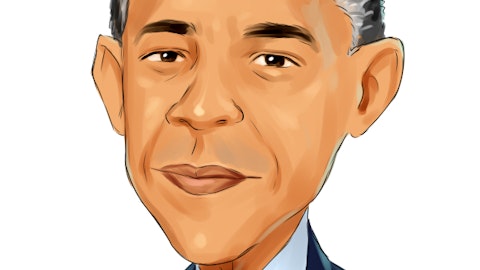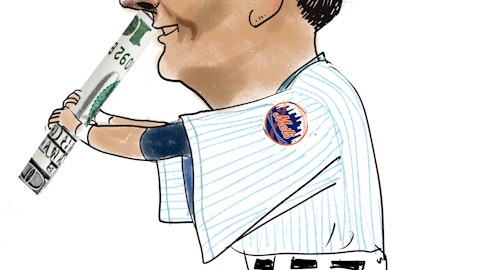$8 Billion Anchorage Advisors is helmed by Kevin Michael Ulrich. The firm primarily invests in credit and special situations with some investments in bank debt. Anchorage has been known to favor a distressed investment strategy, which characterizes many of its top holdings. Here are Kevin Michael Ulrich’s top 10 stock picks at the end of March:
| DELPHI AUTOMOTIVE PLC | DLPH | 174034 | -23% |
| CENTRAL PACIFIC FINANCIAL | CPF | 122547 | 0% |
| TRANSOCEAN LTD | RIG | 83681 | 206% |
| SYNOVUS FINANCIAL CORP | SNV | 75864 | 0% |
| SPIRIT AIRLINES INC | SAVE | 60469 | New |
| NORTEK INC | NTK | 60165 | 2% |
| STERLING FINANCIAL CORP | STSA | 47455 | 0% |
| LEAR CORP | LEA | 45137 | -23% |
| SUN BANCORP INC | SNBC | 29865 | 0% |
| LOUISIANA PACIFIC CORP | LPX | 28705 | New |
Delphi Automative (NYSE: DLPH) is the largest pick in Anchorage Advisors’ portfolio. The company announced last week it would acquire FCI Group’s Motorized Vehicles division (MVL) from Bain Capital in a 60% cash, 40% credit, ~$970 million deal. The EBITDA margins on this business are great at ~15%, which management believes can grow to ~17% in the next few years with synergies, due to MVL’s product portfolio presence in two high-margin auto parts: connectors and ECU’s (engine control units). DLPH indicated that the deal was priced at ~7x 2012E EBITDA. DLPH expects to benefit from ~$80 million in synergies by 2015, which if fully realized would drop that multiple to 4.5x 2012E EBITDA while DLPH currently trades at ~4.8x 2012E EBITDA. Our major concern is that over half of MLV’s customer base is Europe-based with about a quarter of revenues attributed to Germany and another quarter attributed to France and Italy, which is disconcerting given the macro backdrop. While this deal could well be accretive next year, we would prefer to invest in more geographically diversified companies, especially in the volatile auto parts industry.

Central Pacific Financial (NYSE: CPF) is the third largest commercial bank in Hawaii with 34 branches and ~$4.0 billion in assets. Management has been in the process of rebuilding credit and earnings momentum since CEO John Dean, took the lead position two years ago. Since then, CPF has raised $325 million through TARP exchange and private placement and now boasts a tangible common equity (TCE) of 10.9% versus -2.2% in Q4 2010. We calculate TCE by subtracting intangible assets, goodwill and preferred stock equity from total equity and then dividing by the value of the company’s tangible assets. It measures how much a bank can lose before shareholder equity goes to zero, so the growth in that ratio has been very positive. CPF trades ~115% of book value, which we think is fair given peers trading at ~110% of projected year-end tangible book.
Transocean (NYSE: RIG) provides diversified services including contract drilling for the oil and gas and a fleet of 134 offshore drilling units around the world. As of FY 2011, over 70% of RIG’s fleet was deployed in international markets contributing ~80% to total revenues. Lately though, the company just doesn’t seem to be able to catch a break and shares are down ~40% over the past year. Since the Deepwater Horizon Macondo disaster in April 2010, RIG has struggled to regain the confidence of the Street with a clear direction moving forward, and we see an unsteady recovery through this year. On an EV/EBITDA basis, Transocean is trading at 6.9x 2012 EV/EBITDA, a discount to peers that trade at 8.9x 2012 EV/EBITDA, but we think this discount is justified until RIG proves strong day rates pricing power for its ultra deepwater and deepwater segments. RIG is also held by T Boone Pickens, Michael Price, and Anthony Giammalva.
Synovus Financial (NYSE: SNV) is a financial services and a bank holding company with thirty banking divisions of the Company’s wholly owned subsidiary bank, Synovus Bank with offices predominantly in southeastern US. During the Q1 earnings announcement, management indicated that the SEC’s inquiry was now closed. The company had first received an informal inquiry in 2009 “to determine whether any person or entity has violated the federal securities laws.” Though not disclosed, estimated legal losses range from nothing to $75 million. Our main focus with SNV is more of a technical matter regarding deferred tax assets (DTAs), which is a tax benefit a company can use to reduce future taxes that arises from a temporary difference between GAAP pre-tax income and taxable income. We think SNV will be able to recover their DTA valuation allowance this year, which should facilitate multiple expansion. However, until the company demonstrates a return to long-term profitability, we are not inclined to establish a position.




